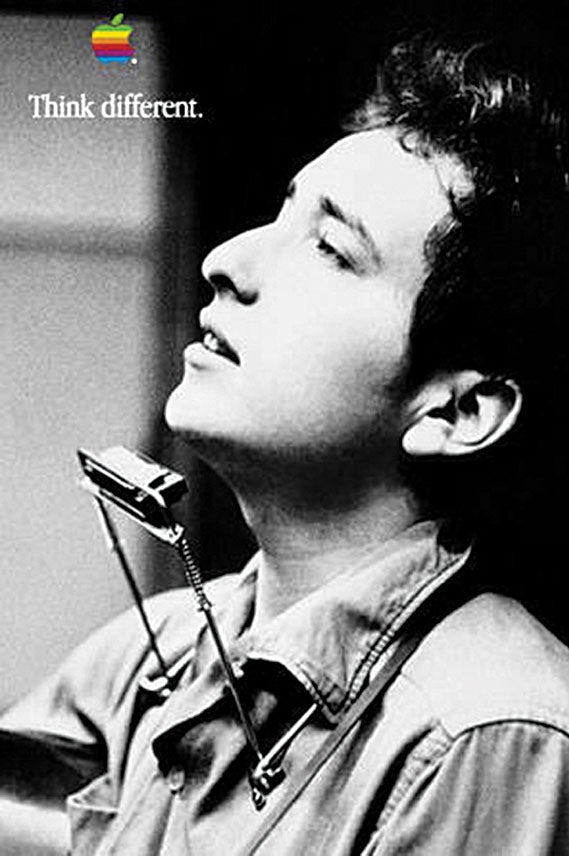08: Apple (1997) – Think Different
Craig Tanimoto, TBWA/Chiat/Day
It’s easy to forget just what a perilous state Apple was in when Steve Jobs returned to the company in 1996. In those pre-iMac, pre-i-anything days, there were widespread predictions that the company would soon disappear. While he waited on the stream of new products that would ultimately revive the brand’s fortunes, Jobs wanted an ad campaign that would remind Apple’s still loyal fanbase of the qualities that had made it great in the first place. The result was one of the most talked-about advertising campaigns of the decade: one which revolved around the deceptively simple, grammatically clumsy slogan ‘Think Different’.

Accounts of the campaign’s genesis vary. Apple’s agency TBWAChiatDay still refuses to go on the record about its contribution – a consequence of Apple’s insistence on silence from whomever it works with. But thankfully we have two new sources to draw on. Walter Isaacson’s Steve Jobs biography devotes a section to ‘Think Different’ while a recent Forbes story from former ChiatDay creative director Rob Siltanen offers another perspective.

While Isaacson’s book plays up Jobs’ role somewhat, suggesting that he co-wrote the ‘To the crazy ones’ commercial and that he shares credit for the slogan itself, Siltanen is having none of it. “While several people played prominent parts in making it happen, the famous ‘Think Different’ line and the brilliant concept of putting the line together with black-and-white photographs of time-honoured visionaries [including Rosa Parks, left and John and Yoko, right] was invented by … Craig Tanimoto, a TBWAChiatDay art director at the time,” he maintains. IBM was running a campaign under the line ‘ThinkIBM’. Tanimoto reasoned that his suggestion would playfully underline the gulf in attitude between the two organisations.

The original plan was for a print only campaign but ChiatDay also decided to make a ‘mood video’ to set the tone, originally cut to the Seal song Crazy. Jobs loved the video and wanted to run it as a commercial but the agency couldn’t make a shorter edit work with the song and Siltanen suggested writing a voiceover script instead. He promised Jobs it would be as inspirational as the Robin Williams film Dead Poets Society, a Jobs favourite.
When the agency first presented Jobs with what it hoped was the finished film, Siltanen remembers a trademark Jobs fit of pique: “It sucks! I hate it! It’s advertising agency shit! I thought you were going to write something like Dead Poets Society! This is crap!”

Siltanen says he’d had enough of Jobs after that and returned to work on other accounts, leaving ECD Lee Clow to handle the situation. The agency persisted and, after a few tweaks by various writers, won Jobs round.
The next major stumbling block was in choosing an actor to read the script. Siltanen wanted Robin Williams but he refused to do any advertising, even after Jobs attempted to call him personally (his wife refused to put Jobs through). Tom Hanks was also suggested but, again, no luck and so Richard Dreyfuss, a known Apple fan, got the gig. Clow, however, also had another, more left-field suggestion: Jobs could read it himself. “It will be really powerful to have it in your voice. It will be a way to reclaim the brand,” Isaacson has Clow arguing. Jobs did the recording but right up until broadcast was undecided which version to go with: Dreyfuss eventually won out and the spot became a huge hit.
Just as he had got involved in choosing the voiceover artist, Jobs also brought his personality and contacts book to bear on securing image rights for the print ads. He personally called the Henson and Kennedy families to obtain permissions and went all the way to New York to convince Yoko Ono to let him use a particular picture of her and John Lennon.

Jobs’ incredible commitment to detail when it came to Apple’s marketing continued throughout his career, personally approving each new ad. Although great products would be the foundation upon which Apple’s turnaround was built, Jobs also knew the value of great marketing. ‘Think Different’ wasn’t solely responsible for the upturn in Apple’s fortunes in the years after it ran but it played an extremely important role in rallying customers, employees and shareholders at a very difficult time for the company. It restated the brand and its aspirations. More importantly, it promised that with Jobs now back at the helm, Apple had its mojo back. And so it proved.
-
Post a comment

















